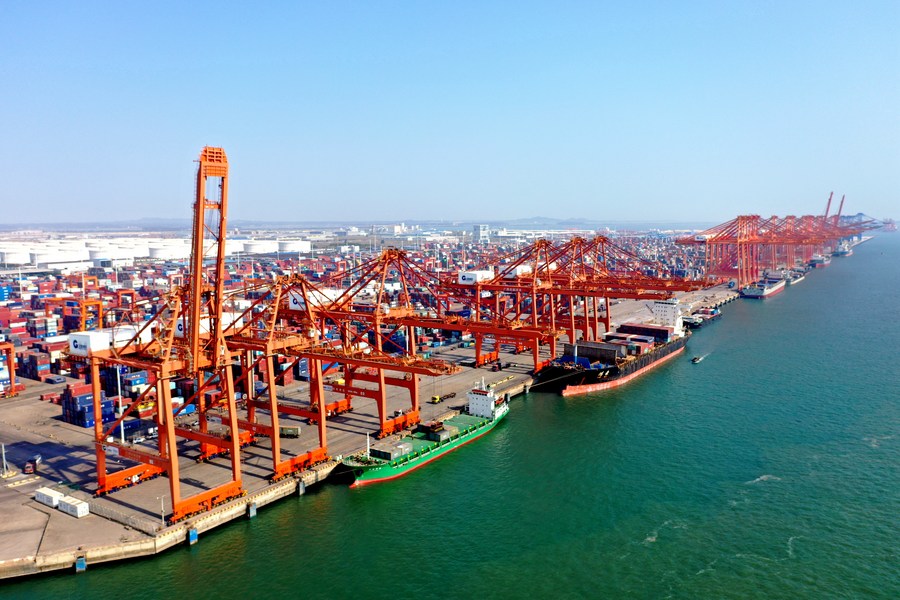
China and Malaysia — two strong supporters of economic globalization — will boost bilateral trade, broaden investment flows and create more jobs, as their enhanced partnership benefits from strengthened mutual trust and steady advances under the framework of the Belt and Road Initiative, said government officials and exporters.
As the world grapples with rising unilateralism and protectionism, they said the degree of interdependence between China and Malaysia remains stable in bilateral cross-industry trade, trade in services and supply chain development, especially in areas such as electronics, palm oil, renewable energy, the digital economy and logistics.
Zhang Jianping, deputy director of the academic committee at the Chinese Academy of International Trade and Economic Cooperation in Beijing, said that looking ahead, the two countries are expected to accelerate cooperation in both emerging and traditional sectors, including green technology, artificial intelligence and infrastructure connectivity.
READ MORE: China-ASEAN cooperation rising to higher level
"This deepening collaboration will be bolstered by upgraded free trade arrangements like the Version 3.0 China-ASEAN (Association of Southeast Asian Nations) Free Trade Area, increased regional integration under the Regional Comprehensive Economic Partnership, and dynamic international production capacity cooperation under the BRI," he said.
Trade between China and Malaysia totaled 1.51 trillion yuan ($206 billion) in 2024, up 12.7 percent year-on-year, while bilateral trade grew 3.6 percent to 213.67 billion yuan in the first two months of this year, according to the General Administration of Customs.
With the United States using tariffs as a weapon to exert maximum pressure on many economies and engaging in zero-sum games to pursue its own interests, China and Malaysia, which is the rotating chair of ASEAN for 2025, are expected to form closer ties to maintain Asia's economic stability and create a buffer against unilateralism.
ALSO READ: RCEP emerges as anchor for free trade amid rising protectionism
In a video meeting held earlier this month with Tengku Zafrul Aziz, Malaysia's minister for investment, trade and industry, Chinese Commerce Minister Wang Wentao said that the US' so-called "reciprocal tariffs" disregard the hard-won balance of interests achieved through years of multilateral trade negotiations and ignore the fact that the US has long reaped substantial benefits from international trade, according to a statement released by the Ministry of Commerce.
This move severely undermines the legitimate rights and interests of all parties involved, including China and ASEAN member states, and represents a typical act of unilateral bullying, Wang said.
He reiterated that China is willing to work with its trading partners, including ASEAN member states, to strengthen communication and coordination, address respective concerns through equal dialogue and consultation based on mutual respect, and jointly uphold the multilateral trading system.
READ MORE: Secretary-general says ASEAN seeks closer ties with China
The Malaysian minister said the relevant policies of the US administration do not conform to the principles of free and fair trade as stipulated by the World Trade Organization.
Malaysia fully respects China's position and is willing to jointly support multilateralism and the development of global trade, he said, adding that his country will consult with other ASEAN members to formulate a coordinated response to the US' "reciprocal tariffs".
While policymakers in both countries have pledged to safeguard multilateralism and deepen regional trade ties, Chinese companies are already benefiting from the steady growth of bilateral trade. Ningbo JF Furniture, a manufacturer based in Ningbo, Zhejiang province, is one such example.
ALSO READ: Xi's SE Asia visit: Neighbors prioritized in diplomacy
"Malaysia is one of our key overseas markets. We have a deep understanding of customer needs and make personalized furniture to meet local demand," said Chu Jiangwen, a logistics manager at the company.
The company's exports to Malaysia reached 15 million yuan in the first quarter of this year, marking a 25 percent increase compared with the same period last year, according to data from Ningbo Customs.


